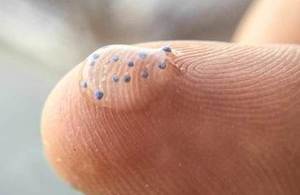Government sets out next steps to ban microbeads
Government announces consultation to ban microbeads in cosmetics and personal care products.

Image credit: MPCA Photos on Flickr. Used under Creative Commons.
A consultation to ban microbeads in cosmetics and personal care products has launched today, aiming to change legislation by October 2017 and stop billions of tiny pieces of plastic ending up in our seas each year.
Microbeads – added as exfoliators to face scrubs, toothpastes and shower gels – can cause serious harm to marine life, with one shower sending up to 100,000 beads down our drains.
Many companies have already taken steps to voluntarily phase them out, and Christmas shoppers on the hunt for last-minute bargains are being urged to look for products that use natural alternatives.
Environment Secretary Andrea Leadsom said:
Adding tiny pieces of plastic to products like face washes and body scrubs is incredibly damaging to our sea life – they can swallow them, but cannot digest them.
The UK has always been a leader in environmental protection and we take our responsibility to marine life – not only in our own seas, but around the world – very seriously.
So whether you’re shopping for a loved one, or picking up a bargain in the sales, I urge shoppers to check any rinse-off cosmetics they are buying are microbead free.
It’s encouraging many retailers and manufacturers are already taking action to phase out microbeads, but today we are making sure that in future they will have no place in personal care products, like shower gels and face scrubs, that end up going down the drain.
Products that don’t contain microbeads but have the same exfoliating properties are readily available, with many manufacturers using natural alternatives like nut shells, salt and sugar in their products.
Dominic Winter, Sustainability Manager at Neal’s Yard Remedies, said:
We have never used microplastics in any of our products, which means shoppers can feel good that the products they buy are not harming our oceans. There are a range of highly effective natural, sustainable options when purchasing personal care products, with ingredients that have a hugely reduced impact on the environment.
Government is committed to protecting seas, oceans and marine life around the world from pollution. As well as the successful introduction of the 5p plastic bag charge – which has nearly cut the number of bags found on beaches by half – there is also ongoing work to create a ‘bluebelt’ of marine conservation areas around the UK.
The consultation outlines proposals to ban the manufacture and sale of cosmetics and personal care products containing microbeads and looks at what more can be done in the future to prevent other sources of plastic from entering the marine environment.
Dr Laura Foster, Head of Pollution at the Marine Conservation Society, said:
It’s great the Government announced its intention to ban microbeads in cosmetics and personal care products. This consultation gives an opportunity to show the UK can be a world leader in improving the health of our oceans and reducing microplastic pollution.